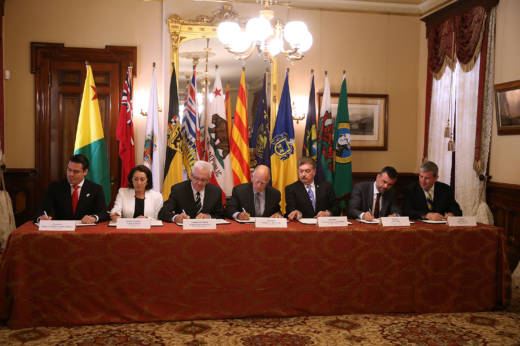“California will not retreat,” said Kevin de León, president pro tempore of the California State Senate, speaking at the meeting. “California will continue to be a beacon of hope and opportunity for the entire world.”
As anxiety over the future of the climate treaty grew, de León said many countries sought meetings with California.
“There were a lot of nations and subnationals that were seeking a real sense of assurance that California will continue to move forward with its progressive climate change policy and leadership,” he said.
At which point, the international Paris treaty came up.
“It was a discussion point,” de León said. “The question was: Could the state of California be a direct party to the Paris accords through the United Nations? There are folks out there who are trying to see if this is legally possible. “
At the meeting, de León said “we’re not there yet but that’s always an option I want to keep open.”
So, would it work?
“The short answer is no,” said Michael Wara of Stanford Law School.
The central reason is that the authors of the Constitution didn’t leave a lot of wiggle room.
“They were very careful to ensure that the federal government and the president in particular would have sole authority to conduct foreign affairs,” he said.
California has tested this before. In 1999, the state passed a law requiring European insurance companies disclose the names of people who signed up for policies before World War II. Families of Holocaust survivors were having trouble collecting insurance because the paperwork had been lost or destroyed in the war.
The California law revoked the licenses of foreign insurance companies that didn’t comply. At the same time, the federal government was holding its own negotiations on the matter.
In the end, the Supreme Court struck down California’s law, finding that “there shouldn’t be two foreign policies,” Wara said.
“That hasn’t mattered until now when it comes to climate,” he said. “The Obama Administration has loved the fact that California is out as leader, trying to advance its own agenda, sort of acting like a nation state. But we don’t live in that world anymore.”
The other reason California probably couldn’t sign on to the treaty comes from international law, according to Wara.
“Only nation-states can be parties to international agreements and only members to the UN Framework Convention on Climate Change can be members of the Paris agreement,” he says. “And California is not a member.”
Still, Wara says signing the treaty may not matter, because California has adopted it in practice.
“California has set objectives for itself that are far more aggressive than the U.S. commitments under the Paris agreement,” he said.
The state has an ambitious climate goal to slash emissions by 2030 through cleaner cars, renewable energy and its cap-and-trade program, which regulates power plants and manufacturers.
Governor Brown has also launched his own climate movement, known as the Under2 MOU, where the state has signed agreements to cut carbon emissions with more than 100 city and regional governments worldwide.
“Lots of informal cooperation can actually be more important and more meaningful than the formal arrangements,” Wara said.
